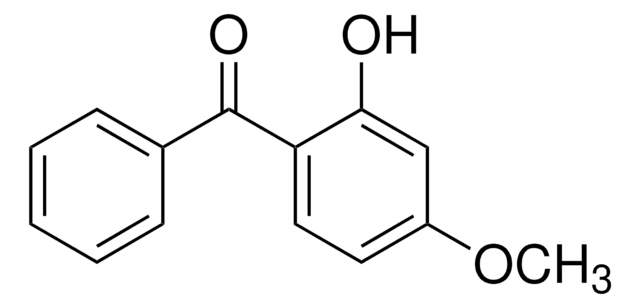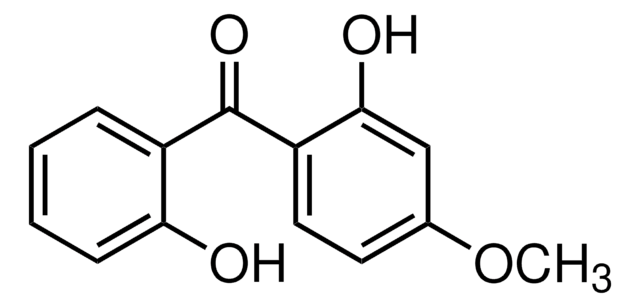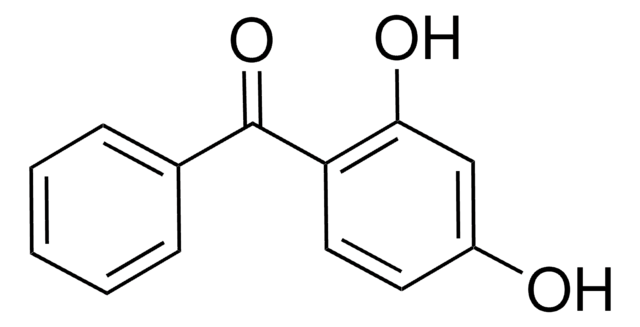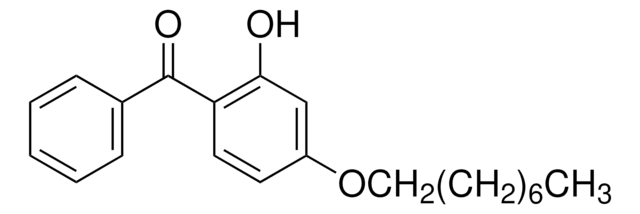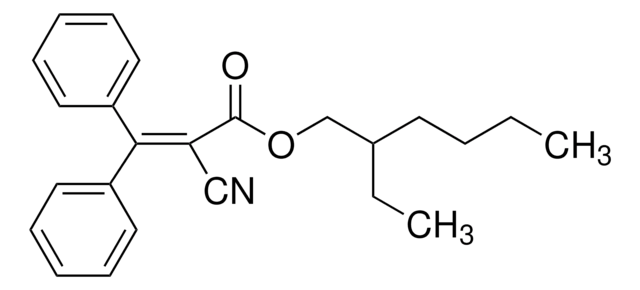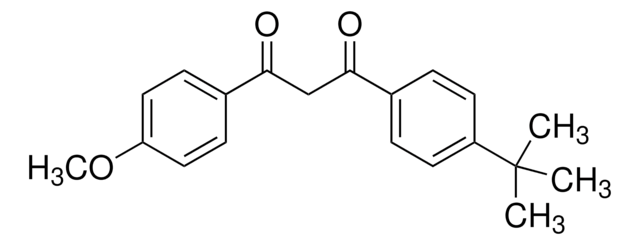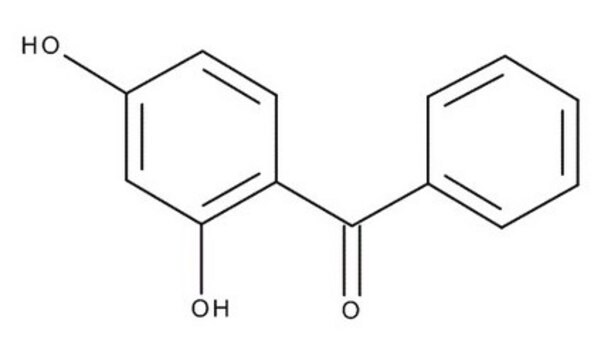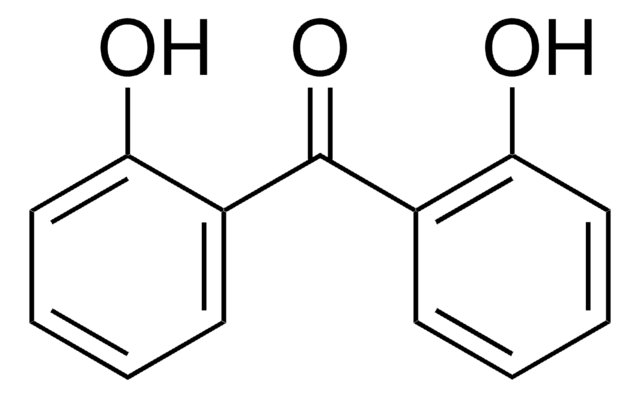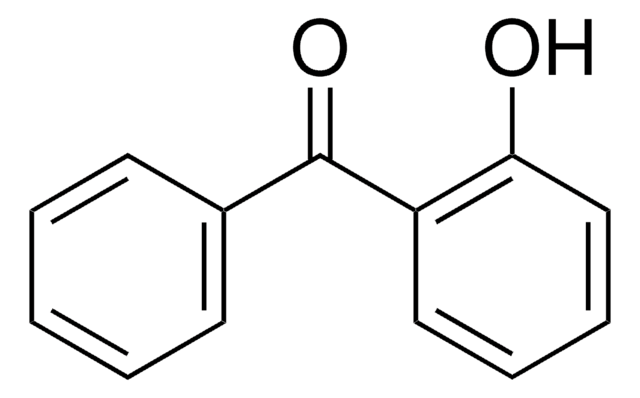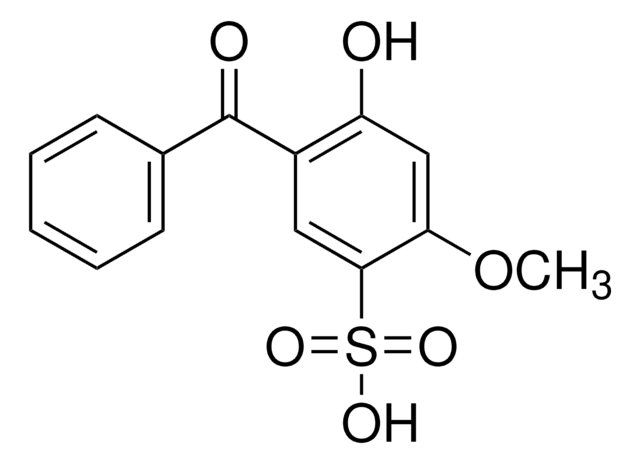추천 제품
분석
97%
mp
198-200 °C (lit.)
SMILES string
Oc1ccc(c(O)c1)C(=O)c2ccc(O)cc2O
InChI
1S/C13H10O5/c14-7-1-3-9(11(16)5-7)13(18)10-4-2-8(15)6-12(10)17/h1-6,14-17H
InChI key
WXNRYSGJLQFHBR-UHFFFAOYSA-N
유사한 제품을 찾으십니까? 방문 제품 비교 안내
관련 카테고리
애플리케이션
- Urinary concentrations of bisphenol A, parabens and benzophenone-type ultra violet light filters in relation to sperm DNA fragmentation in young men: A chemical mixtures approach.: This study investigates the relationship between urinary concentrations of various chemicals, including benzophenone-type UV filters like 2,2′,4,4′-Tetrahydroxybenzophenone, and sperm DNA fragmentation. The findings highlight potential reproductive toxicity risks associated with exposure to these compounds (Kiwitt-Cárdenas et al., 2024).
- Salting-out assisted liquid-liquid extraction combined with LC-MS/MS for the simultaneous determination of seven organic UV filters in environmental water samples: method development and application.: This paper discusses the development of a method for detecting organic UV filters, including 2,2′,4,4′-Tetrahydroxybenzophenone, in environmental water samples. The method offers a reliable way to monitor the presence of these compounds in the environment (Carve et al., 2023).
- Novel visible-light-active P-g-CN-based α-Bi(2)O(3)/WO(3) ternary photocatalysts with a dual Z-scheme heterostructure for the efficient decomposition of refractory ultraviolet filters and environmental hormones: Benzophenones.: The study presents a new photocatalyst capable of degrading benzophenone-type UV filters, including 2,2′,4,4′-Tetrahydroxybenzophenone, under visible light. This development has significant implications for environmental cleanup technologies (Berekute et al., 2023).
- Boosting elimination of sunscreen, Tetrahydroxybenzophenone (BP-2), from water using monopersulfate activated by thorny NanoBox of Co@C prepared via the engineered etching strategy: A comparative and mechanistic investigation.: This research explores a novel method for removing 2,2′,4,4′-Tetrahydroxybenzophenone from water using advanced nanotechnology, highlighting its effectiveness and potential for environmental applications (Khiem et al., 2023).
- The binding mechanism of benzophenone-type UV filters and human serum albumin: The role of site, number, and type of functional group substitutions.: The study examines how benzophenone-type UV filters, including 2,2′,4,4′-Tetrahydroxybenzophenone, interact with human serum albumin, providing insights into their behavior in biological systems and potential health implications (Ma et al., 2023).
신호어
Warning
유해 및 위험 성명서
Hazard Classifications
Acute Tox. 4 Oral - Eye Irrit. 2 - Skin Sens. 1A
Storage Class Code
11 - Combustible Solids
WGK
WGK 3
Flash Point (°F)
Not applicable
Flash Point (°C)
Not applicable
개인 보호 장비
dust mask type N95 (US), Eyeshields, Gloves
이미 열람한 고객
Christiane Schlecht et al.
Toxicology, 205(1-2), 123-130 (2004-10-02)
The estrogen receptors (ERs) are members of a super family of ligand-activated transcription factors mediating estrogenic responses. A close functional kinship was found for the structurally related estrogen receptor-related receptor1 (ERR1), a constitutively active transcription factor. The aryl hydrocarbon receptor
Dana Seidlová-Wuttke et al.
Toxicology, 213(1-2), 13-24 (2005-06-14)
The endocrine active substances BPA, DBP and BP2 have estrogenic effects in the uterus. Proc and Lin were shown to be antiandrogenic. Whether other estrogen-regulated parameters like lipids, fat metabolism and hormones are also affected by these substances is unknown.
Christiane Schlecht et al.
Archives of toxicology, 80(10), 656-661 (2006-04-06)
The tetrahydroxylated biphenyl-ketone 2,2',4,4'-tetrahydroxybenzophenone (BP2), one of twelve benzophenone-derived UV-filters, is used in cosmetic products and in packaging materials to protect these products from light induced damage. Recently published studies showed that BP2 exerts estrogenic activity; thus, it is an
Tatyana Shaw et al.
Dermatitis : contact, atopic, occupational, drug, 21(4), 185-198 (2010-07-22)
Rising use of sunscreen products has led to increased reporting of adverse reactions to sunscreens. To investigate possible photoallergic reactions in patients who identified themselves as "being allergic" to sunscreens. Patients filled out questionnaires about types of sunscreens they used
Christiane Schlecht et al.
Toxicology, 245(1-2), 11-17 (2008-02-05)
Twelve derivatives of benzophenone (BP1-BP12) are widely used as UV-screens to protect industrial products from light induced damage. There is growing public concern about industrially produced chemicals that might interfere with hormonal signalling pathways, thus having potential adverse effects on
자사의 과학자팀은 생명 과학, 재료 과학, 화학 합성, 크로마토그래피, 분석 및 기타 많은 영역을 포함한 모든 과학 분야에 경험이 있습니다..
고객지원팀으로 연락바랍니다.